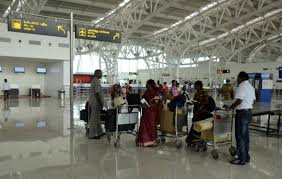
The employees associated with various unions of AAI have formed a joint forum and started the three-day-long strike in front of the Civil Aviation Ministry at Rajiv Gandhi Bhawan here and at AAI offices across the country.
"We are protesting against the Civil Aviation Ministry's move to privatise six airports of Chennai, Kolkata, Guwahati, Jaipur, Ahmedabad and Lucknow. These were being after the AAI invested crores into modernisation of these airports," said B S Ahlawat, General Secretary of Airports Authority Employees' Union, which is leading the agitation.
The government in early September had decided to allow private parties to pick up 100 per cent equity stake in operation and management of the six airports through the public-private partnership (PPP) mode.
The successful bidder is supposed to enter into partnership with the state-run airport operator AAI on a 30-year lease to operate, manage and develop facilities at these airports. The scope of the project includes the entire airport, including the airside and city side facilities.
Ahlawat said Civil Aviation Ministry's move is unwarranted as employees at the Delhi and Mumbai airports are still to be deployed after both the airports were privatised.
"And the government is again trying to destabilise the employees of these six airports," he said, adding "if they fail to listen to us, then we would be forced to intensify our action by going on strike or gherao of AAI officials."
These six airports have already been modernised by state- run AAI at a high cost to the exchequer. The modernisation of Kolkata and Chennai airports alone has cost the AAI Rs 2,325 crore and Rs 2,015 crore respectively.
The government's move has come under severe criticism from several quarters, including airlines and their global representative body, International Air Transport Association, primarily on the grounds that it would lead to massive hike in airport costs and charges.
Ahlawat said AAI took up the project based on the government's assurance that Chennai and Kolkata terminal won't be privatised and would be managed by AAI.
Chennai and Kolkata are the only two metro airports that are being run by the AAI and has been a major revenue earner.






Comments
Add new comment